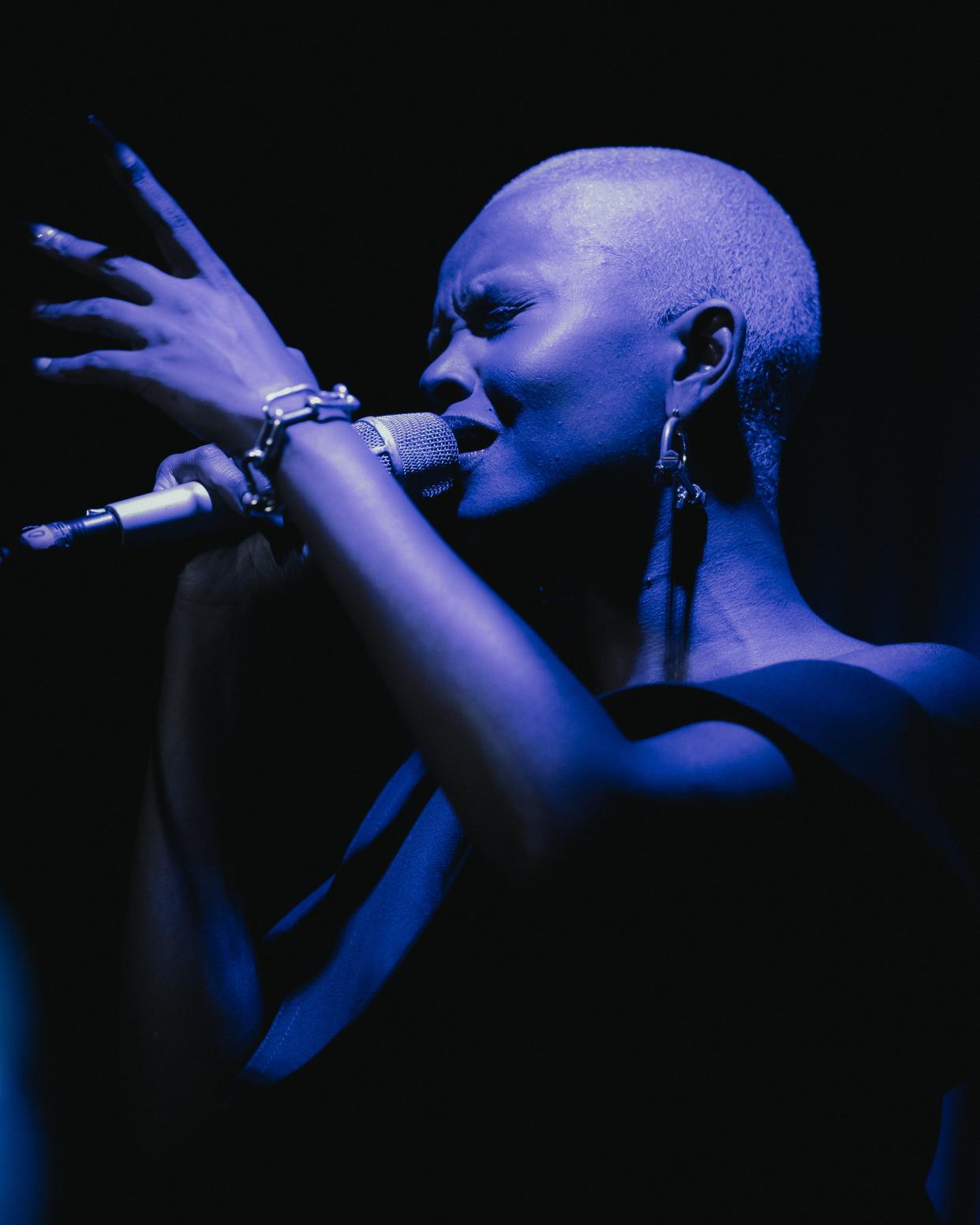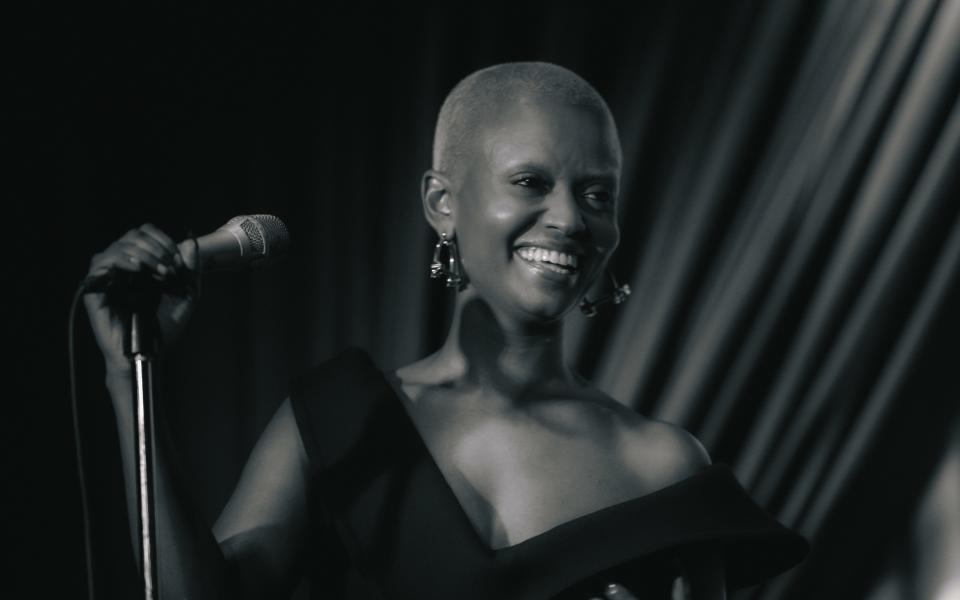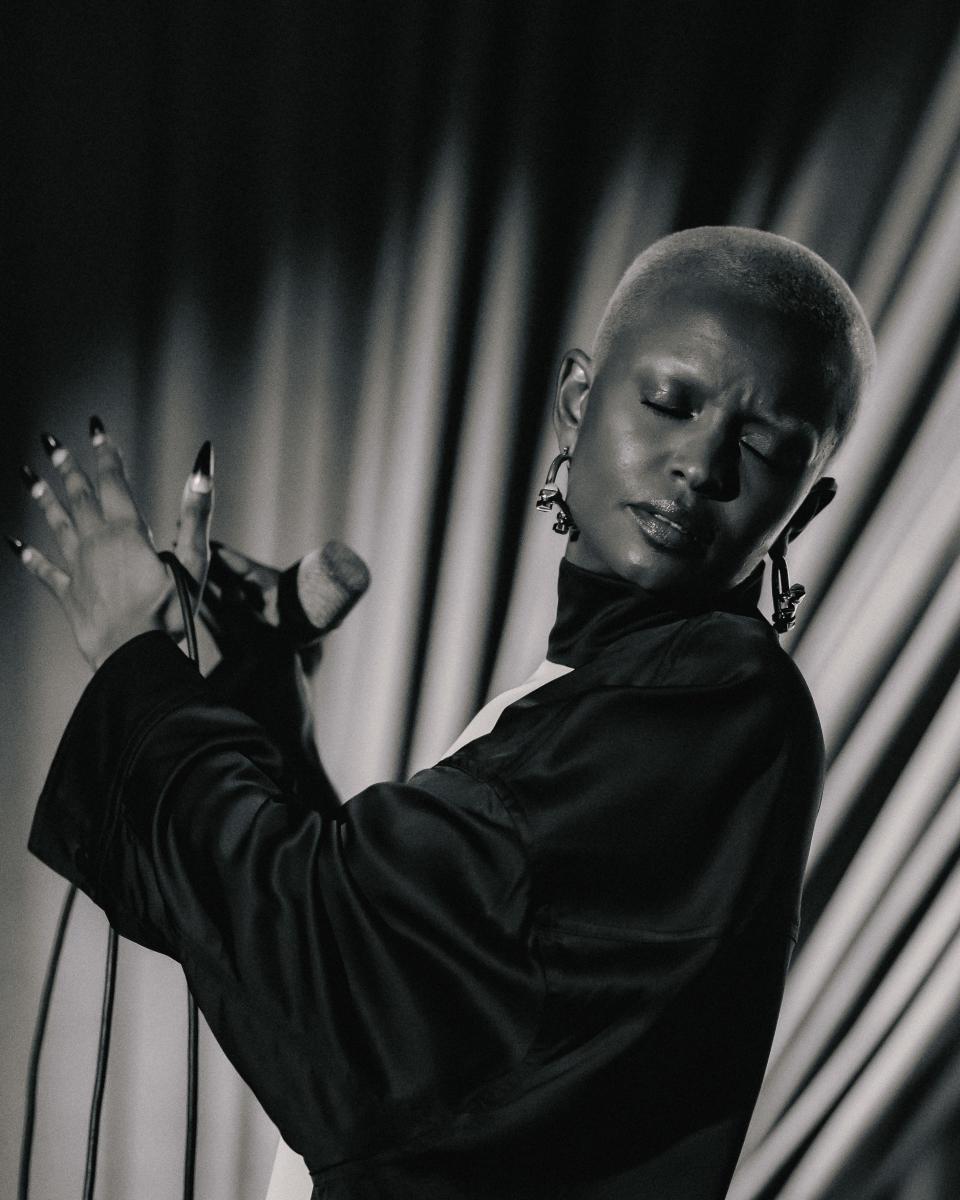Kelela Walked Away From Music for Years. At an Intimate New York Show, She Came Back to Find Her Fans Waiting

Dervon Dixon
The year is 2003. A 19-year-old Kelela Mizanekristos sits alone at the Blue Note Jazz Club in New York’s West Village, a MiniDisc recorder concealed under her table. An electric solo set by Groove Theory co-founder Amel Larrieux makes the arduous four-hour drive from DC worth it. She has a 7 am class the next morning, but Larrieux’s music—and music, period— is all that matters to her at this moment. “She taught me so much about performance and just going for it and not trying to be perfect. She would just give her all in this way that didn’t feel safe,” Kelela gushed about Larrieux two decades later. “I think that was what drew me to her. I saw so much of myself in that. More than anything, I would like to give that back to someone else.”
It was a full-circle moment; she told this story from the stage at the Blue Note at the end of May, on the second night of a sold-out two-night engagement at the legendary venue. Kelela released her debut album, Tear Me Apart, back in 2017; a remix album followed one year later. Then she went quiet, for more than four years. In a frenetic world where attention spans get shorter each day, few contemporary artists can take a hiatus that long and expect to find their fan base waiting for them when they return. Kelela was an exception; her audience apparently never stopped feeling her absence.

kelela body1
Dervon DixonIn a video promoting her second album Raven—which dropped in February 2023—a montage of tweets from the still-devoted flashes onscreen. “When the world needed her most…she vanished,” one fan joked in a tweet from 2021. “KELELA WE NEED YOU!! WHERE ARE YOU???” another Kelalien begs. And when she stepped onstage at the Blue Note, accompanied by two backup singers and a four-piece band, the mainly Black, queer and queer-adjacent crowd greeted her as a returning hero, back to provide New York’s weary masses with some much-needed respite.
Raven, Kelela’s long-awaited sophomore album, is best described as a sound bath. I’m not an expert in neurology but if someone told me that the frequency of Kelela’s vocals mimics that of SoftWave therapy, I’d be inclined to believe them. Soothing ambient tunes soundtrack unsettling revelations about feeling unworthy of love, the consequences of taking a stand, and being too Black, too queer, too femme, and too outspoken for this world. During her multi-year break from music, Kelela sent letters and a resource guide—with recommended reading like Reader on Misogynoir by Kandis Williams and the will to change by bell hooks—to those in her orbit, officially informing them of her politics. They had to get with it or get out. She would end up parting ways with both Sony, her record label, and her managers, IMG; in an interview with Dazed, she described those breaks as “an act of self-care. It’s just something that makes me feel more healthy and in alignment with my values.”
Although she’s known for body roll-inducing dance hits like “Blue Light” and sultry R&B tracks like “Enough for Love,” Kelela initially considered becoming a jazz singer, and cites Betty Carter as one of her three singer-songwriters of all time. “The tradition of reinterpretation and flipping and rearrangement that exists in jazz is definitely part of what has informed the remixing and the Aquaphoria of it all,” she explained from the stage at the Blue Note show. (Aquaphoria was a 2019 collaborative mix with the L.A. DJ/producer Asmara of Nguzunguzu, on which Kelela adds her own ethereal freestyle vocal runs to ambient tracks by artists like Visible Cloaks, Jonny Nash & Suzanne Kraft, and even Jaco Pastorius and Joni Mitchell.) “It’s just a very Black American practice," she said. "I want to pay homage and respect to all the people who suffered for this music to exist and for it to get us in our feels.”

Kelela body2
Dervon DixonI revisit Kelela’s interviews as much as I do her music. Since her debut, she’s been vocal and principled about her moral stances and causes that she supports. Her verve is refreshing in a society where being apolitical and indifferent to the suffering of others is seen as a sign of maturity. No Kelela show is complete without her challenging her audience to be mindful of what it means to be in her community. “We’ve divorced the art from the artist. Fuck that! There is a politic guiding this,” she asserts. “It is reparations now. It is free Palestine, it is free Congo. We have to end this occupation. I need to hear white people say ‘white supremacy.’ For how much it exists in this world, for how much I have to fight through. If you don’t help us dismantle this system, it’s not going to happen.”
In the hours leading up to this show, I played “Altadena,” the final track on Take Me Apart, on a loop. I’ve written and rewritten this paragraph multiple times. Ironically, even through my frustration about my place in the world as a queer Black woman, I feel compelled to self-censor to appease—as to not appear spiteful or ungrateful. The apathy of the world and those in my professional sphere was slowly chipping away at me. “Where can I go?” Kelela muses in my ear. With Raven, its accompanying tour, the remix collection RAVE:N, and now these Blue Note shows, she’s shifting her gaze away from those committed to misunderstanding her and towards those who get it. “They tried to break her/There's nothing here to mourn,” she sang at the show, punctuating her words with her pointer finger as if she had someone specific in mind. “Don't need no favors/It's all good, I've moved on.”
Leaving the club, I felt like the embodiment of the “girl who is “going to be okay” meme. Throughout the almost hour and a half set, so few people pulled out their phones, I began to wonder if there was a no-recording policy. When fans did capture snippets of the evening, it was just long enough to secure a memento. Only Kelela could come between an audience of chronically online queer people and their phones—each one waiting with bated breath for the next arresting vocal run, charming aside, or uplifting remark. If nobody got us, we know Kelela got us.
Originally Appeared on GQ


